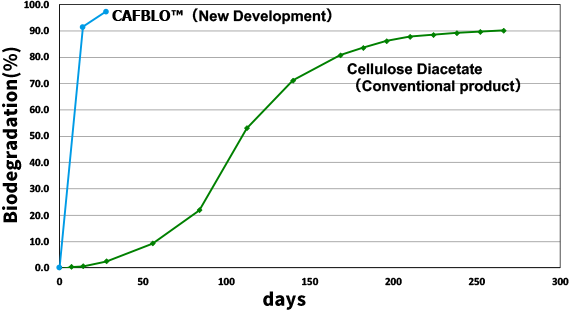Our developed product, Highly Biodegradable Cellulose Acetate, is a product that dramatically improves the marine biodegradability of cellulose acetate, a natural and eco-friendly material.
We gave shape to our thought, "Cellulose Acetate for Blue Ocean", and named it "CAFBLO™".
As an effective solution to marine plastic pollution issue, which has become a global issue, we will propose "CAFBLO™" widely in the future.
Cellulose acetate is an eco-friendly material made from cellulose obtained from wood produced in sustainably managed forests or cotton linters (the hairy fibers that cling to cotton seeds after harvesting) combined with acetic acid, the main constituent of vinegar. It can be processed in the same way as general purpose plastics and is used in a variety of applications. After disposal, it returns to nature through the activity of water and microorganisms.
Marine Biodegradability
In recent years, the challenge of dealing with plastic waste has become an urgent global issue. The serious problem of large quantities of plastic being dumped into the oceans has become a particularly pressing challenge. Most such plastics take decades to hundreds of years to decompose; clearly, an urgent need exists to develop marine biodegradable plastics.
Daicel focuses on the biodegradability of cellulose acetate, has developed highly biodegradable cellulose acetate "CAFBLO™" that decomposes in seawater at approximately twice the rate of conventional products, and holds the same quality as conventional products. Moreover, it can be changed the rate of biodegradation by adjusting the molecular structure.
CAFBLO™ has obtained "OK Biodegradable Marine" certification of TÜV AUSTRIA Belgium, International certification body.

Figure.Marine biodegradability of conventional cellulose acetate vs our new development, CAFBLO™
(testing performed in accordance with the requirements of the OK biodegradable MARINE certification scheme of TÜV Austria).
Comparison with Other Biodegradable Plastics
Cellulose acetate biodegrades in various environments.
Table 1 presents a comparison of the biodegradability of various plastics.
| Environmental conditions | Compost | Soil | Seawater |
|---|---|---|---|
| Cellulose acetate | 〇 | 〇 | 〇 |
| PLA (Polylactic acid)*4 |
〇 | × | × |
| Bio-based PBS (Poly Butylene Succinate) |
〇 | 〇 |
Table 1. Decomposition Time in Nature (from the following sources)
- (*1)“Garbage In: The Problem of Marine Plastics,” WWF Japan
https://www.wwf.or.jp/activities/basicinfo/3776.html (Japanese site) - (*2) “Issues and future prospects of biodegradable plastics,” Mitsubishi Research Institute, Inc.
https://www.mri.co.jp/knowledge/column/20190408.html (Japanese site) - (*3)“Misconceptions regarding PLA as a biodegradable plastic”
http://nature3d.net/explanation/pla_notreally.html (Japanese site) - *4. Plastic comprising mainly polylactic acid
Offering Solutions to the Marine Plastic Waste Issue
The issue of marine plastic waste has been highlighted in recent years. Many common plastics decompose over timescales of decades to centuries, but using cellulose acetate, which decomposes in months to years, as an alternative to conventional plastics, can be a solution. We will proceed to develop applications for new developed cellulose acetate in the future.

